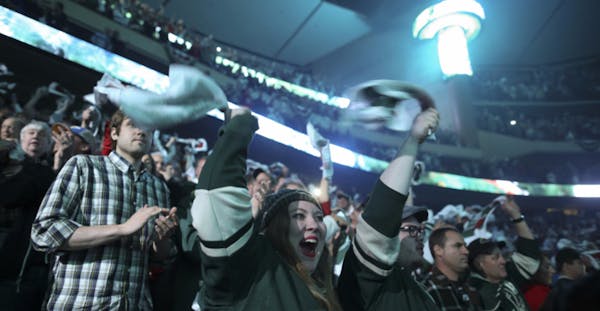 See
more of the story
See
more of the story
Time ran out on Craig Leipold's evaluation of Chuck Fletcher as general manager. The Wild owner had to make a call, yes or no, and not push his decision until later because Fletcher's contract was expiring.
In that context, Leipold made a move Monday that wasn't surprising, cutting ties with Fletcher after nine seasons overseeing the Wild's hockey operation.
Fletcher suffered from a crisis of confidence with fans and, apparently, also within the organization. Leipold acknowledged that he felt fan frustration and when added to his own personal disappointment, the owner really had only one option.
"They're a good team, but they're not good enough right now," Leipold said. "What's defined as good enough? I guess it's like pornography. When you see it, you know it."
Or one could watch the playoffs, too.
The Wild isn't close to winning a championship as currently constructed. Six consecutive playoff appearances seem far less satisfying when conjoined with six quick exits.
The Wild has lost 16 of its past 20 playoff games. The team has only 15 playoff wins total since acquiring Zach Parise and Ryan Suter in 2012. The Wild has fallen into a 0-2 deficit in four consecutive playoff series and seven of the past eight.
Fletcher deserves credit for building a playoff regular and handling job scrutiny with class, but the organization is spinning its wheels. The roster simply isn't built for postseason success. To suggest otherwise would be to foolishly ignore mounting evidence.
Leipold can't be only half-in as he turns the page, though. In one breath, he admitted that "I just don't see us with this team getting to the championship series," but then he also stated emphatically that "this is not a rebuild."
"I'll be very direct about that when I'm interviewing a general manager," he said.
But what if a qualified candidate evaluates the roster and determines that a teardown is needed more than tweaks?
"I wouldn't hire that person," Leipold said. "If [candidates] don't have the same feeling that I do — that we are not far from being the team that we need to be — then that would probably not be the candidate I would choose."
That's a concern. The Wild isn't on the cusp of hoisting the Stanley Cup, so why prevent a general manager from making necessary changes, even if they are grand in scope?
A complete rebuild might not be practical because of salary cap restrictions and no-movement clauses Fletcher granted. And maybe we're arguing semantics between tweaks and significant changes.
The point is that every option should be available for the next general manager. If he wants to make big changes and can justify them, Leipold should be open-minded because the roster needs more than subtle tinkering.
Leipold made it clear he isn't interested in bottoming-out in order to draft high with the hope of landing a franchise-changing talent. That's understandable. Losing is painful and nothing guarantees an expedited return to the playoffs once a team starts down that path.
But the Wild's lack of players capable of carrying the team in the postseason is glaring. The team has struggled to finish scoring chances in the playoffs. The roster needs more high-end talent. A new general manager must have the backing of his boss to be creative and aggressive to fix those deficiencies.
Leipold reiterated that committing $196 million to sign Parise and Suter proved to be a "gigantic" game-changer on the business side. Xcel Energy Center has been sold out ever since. The team still is waiting for a big payoff on the ice.
"Are we still in the window to win the Stanley Cup? I believe we are," Leipold said.
Reaching that level will require some bold moves. Leipold made the right call in changing leadership. The Wild needs new vision on personnel decisions.
The term "rebuild" often incites fear and uncertainty, especially for an organization accustomed to being in the playoffs. Nobody wants to lose, but the Wild's roster requires substantive changes. The next general manager should feel empowered to do whatever is necessary to elevate the team from being good to good enough.
Chip Scoggins • chip.scoggins@startribune.com





